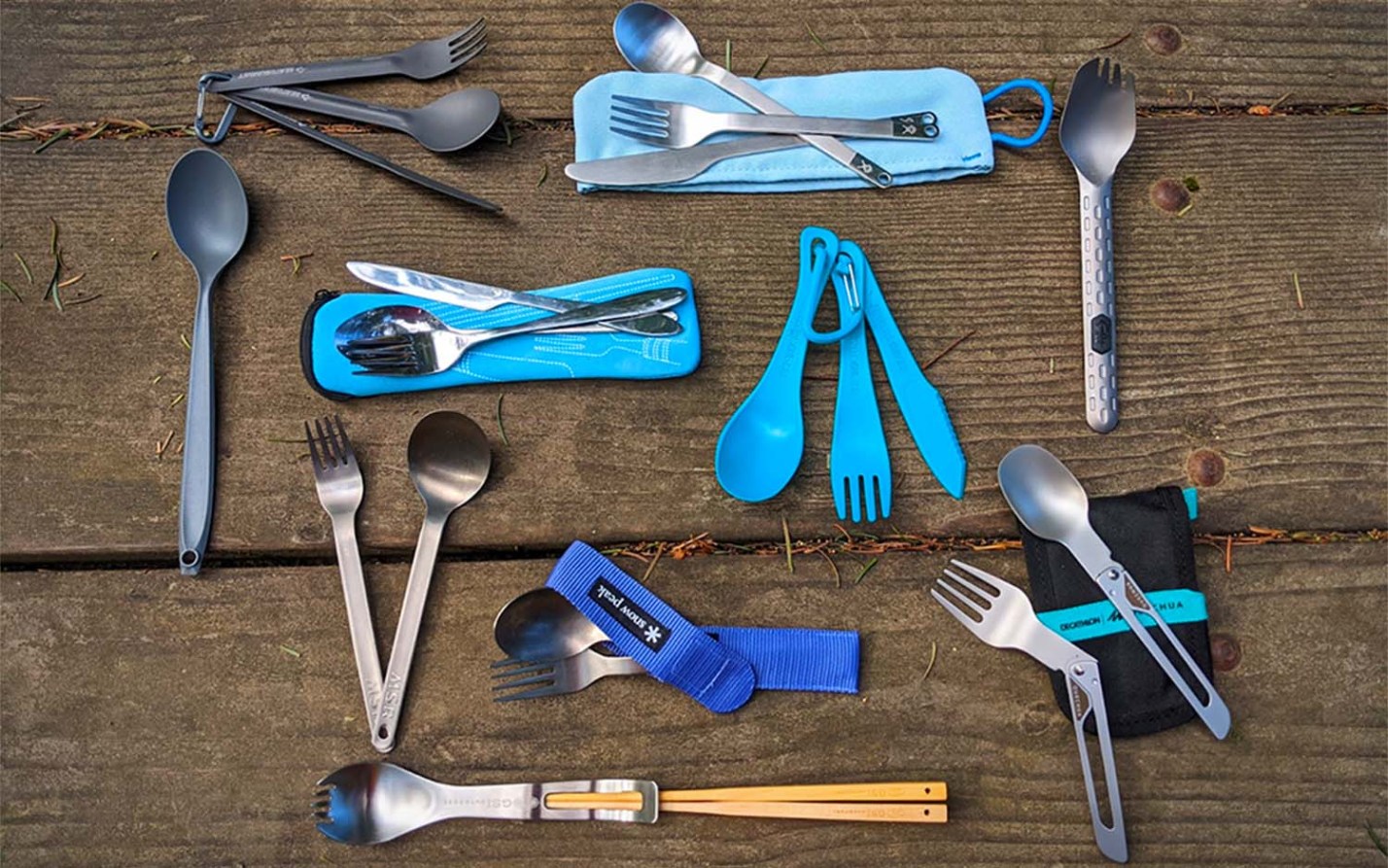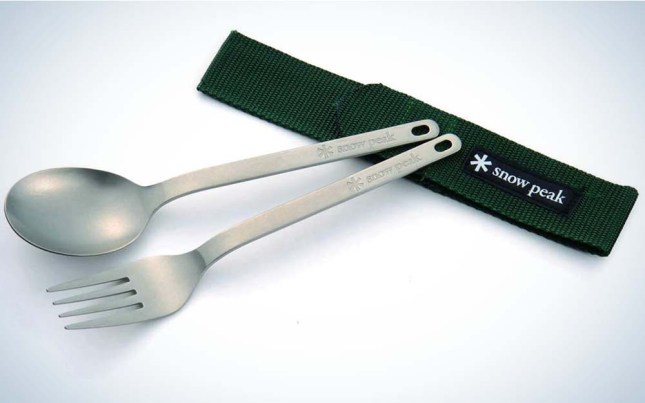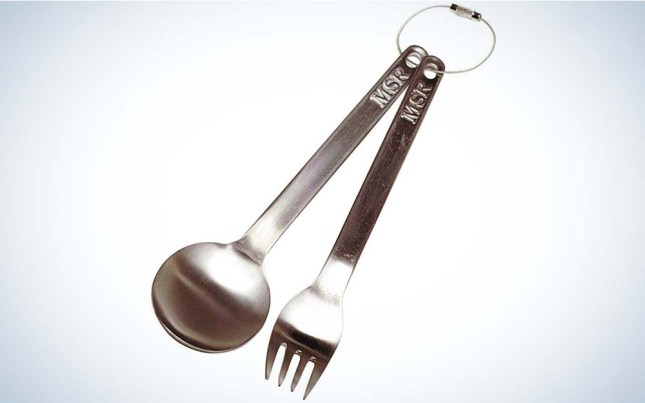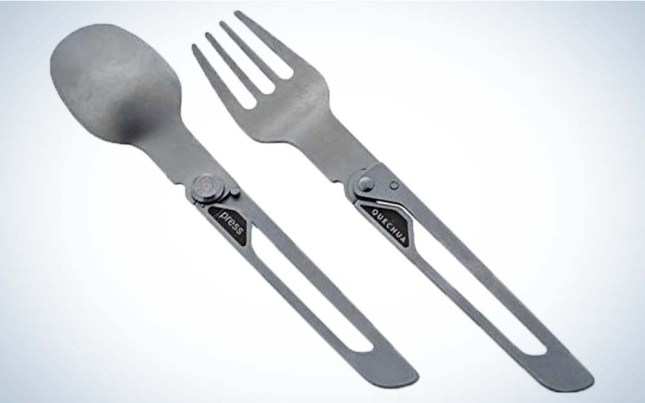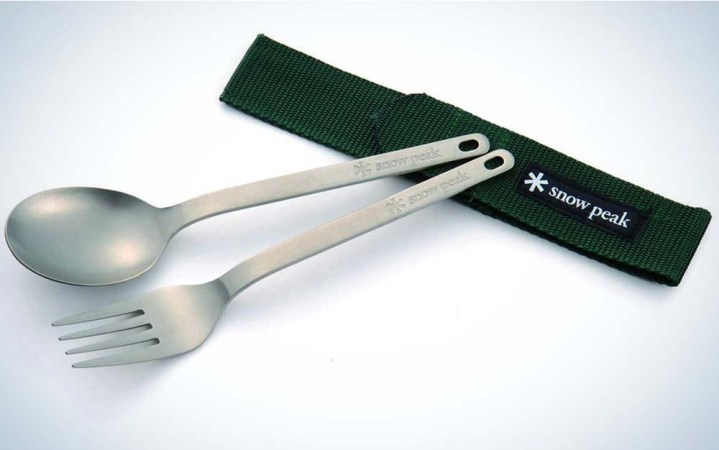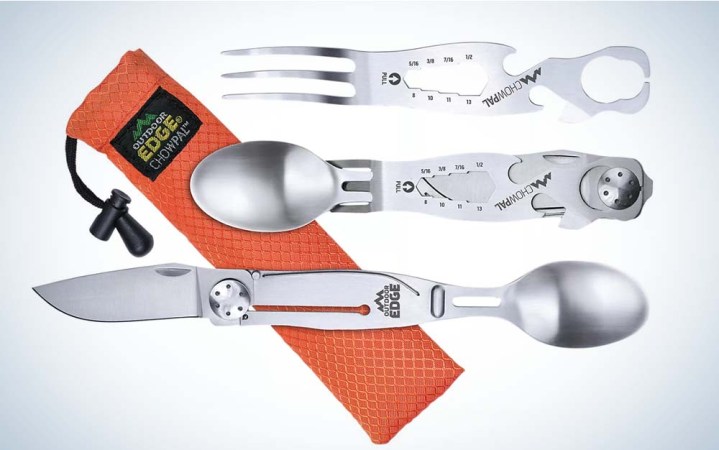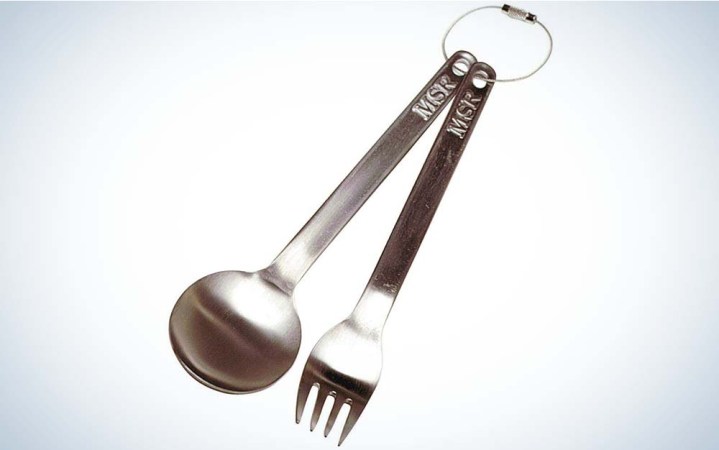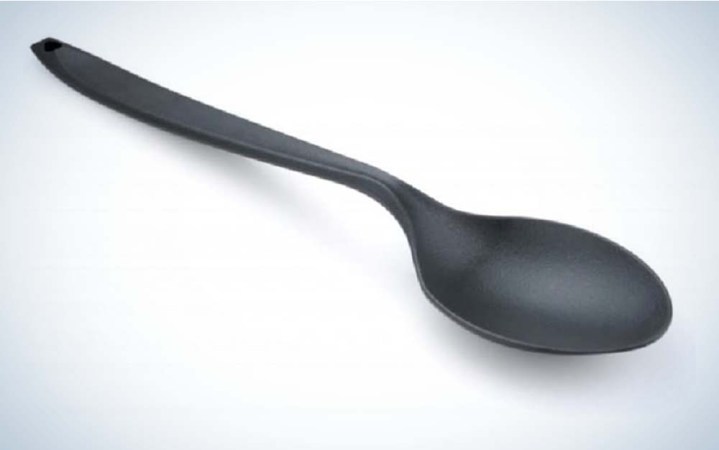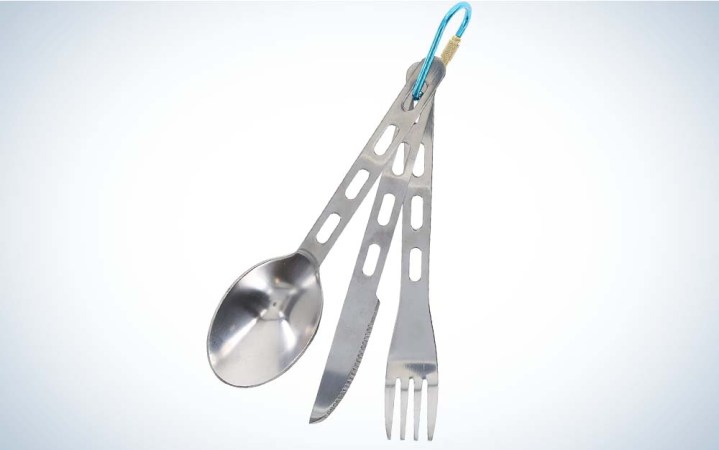We may earn revenue from the products available on this page and participate in affiliate programs. Learn More ›
I’ll admit it, when it comes to camping utensils: I’ve owned a spork or two in my time. Even one of those with a built-in knife. But the spork just didn’t satisfy me. I could never spear my pasta or even hold an adequate amount of soup without it dribbling through the prongs. And the knife? Please. To find something (anything) better, I tested 13 utensils and utensil sets, and even a couple of sporks, and arrived at six of the best camping utensils available today.
- Best Overall: Snow Peak Titanium Fork & Spoon Set
- Best Multi-Function: Outdoor Edge ChowPal
- Best for Backpacking: MSR Titan Fork and Spoon
- Best Minimalist: GSI Pouch Spoon
- Best Budget: Ust Klipp Utensil Set
How I Tested Camping Utensils
To find the best camping utensils, I looked at sets from GSI, Hydro Flask, Snow Peak, Gerber, Coleman, Sea to Summit, MSR, Decathlon, UST, Industrial Revolution, Full Windsor, and Outdoor Edge. I began by independently confirming their weight and length against manufacturer specifications. As such, there are some discrepancies noted in the key features for each write-up. Next, I tested the functionality of each utensil and measured how much liquid each spoon could hold before it spilled over the sides, how effectively each fork picked up olive oil-coated al dente penne pasta and some of the best backpacking food, and how well each knife sliced into a salami.
Next, I tried to break them by bending each utensil at its weakest point (usually the neck). If it bent, I would then bend it back and forth several times to see whether the material would weaken. At the end of testing, I considered which utensil would work best for a variety of outdoor activities, including car camping, backpacking, and thru-hiking, as well as which utensil set would work best for someone planning to engage in all three.
While several of these camping utensils included extra functions, like bottle opener or wrench, I did not consider these in determining which was the best for each category.
Best Camping Utensils: Reviews & Recommendations
Best Overall: Snow Peak Titanium Fork & Spoon Set
Key Features
- Manufacturer Weight: 1.1 ounces; measured weight: 1.2 ounces
- Length: 6.5 ounces
- Materials: Aluminum
- Includes a fork and spoon
Pros
- Lightweight enough for backpacking
- Fork performed well during testing
- Highly durable for its weight
Cons
- No knife option
- Carrying pouch felt heavier than other carabiners I tested
If you’re looking for one set of utensils for both car camping and backpacking, then the Snow Peak Titanium Set is the best option available. Its titanium construction is slightly thicker than the MSR Titan duo I tested, which showed during the durability test when it bent only slightly. This impressive win in durability only cost the Snow Peak 0.2 ounces over my best backpacking pick.
Even better, the fork won the pasta hold test among the lighter weight camping utensils and the spoon came in second, with a pleasing angle that makes slurping hot soup on a cold day no problem. My only real complaint is the lack of a knife, but overall, this set is hard to beat.
Best Multi-Function: Outdoor Edge ChowPal
Key Features
- Manufacturer Weight: 2.4 ounces; measured weight: 2.2 ounces
- Length: 6.5 inches
- Materials: Stainless steel
- Includes fork, spoon, and knife
Pros
- Excellent knife
- Interlocking pieces
- Extremely sturdy
Cons
- Limited spoon capacity compared to others
- Three pronged fork compared to the four of the others
A knife, fork, and spoon all-in-one gets an upgrade with a bottle opener and can opener, and the knife on this set soared during the test. Despite the unusual appearance of the Outdoor Edge ChowPal, this well-designed utensil is both compact and versatile. When the two pieces lock together, the knife and fork stow safely, so you don’t have to worry about stabbing yourself, yet they’re still easy to deploy. And the knife/spoon separates from the fork for a proper dining experience. I really appreciated the knife, which is more akin to a pocket knife than a traditional table knife. And realistically, that’s what I want when I’m ready to slice into my salami in the backcountry anyway.
The only true ding here is the spoon, which is significantly shallower than others I tested—it will work well for scarfing up mashed potatoes, but if you’re planning on a lot of cold-weather soups, you might be disappointed.
Best for Backpacking: MSR Titan Fork and Spoon
Key Features
- Weight: 1 ounce
- Length: 6.8 inches
- Materials: Titanium
- Includes a fork a spoon
Pros
- Lightweight
- Durable for a backpacking set
Cons
- Fork didn’t perform as well as others in my test
This ultralight duo only weighs a smidge lighter than my best overall pick, and I also appreciated the slightly longer spoon for digging food out of my pot. Sure the Snow Peak set performed better in every test over the MSR Titans, but I know that’s not what you gram counters care about. So if you’re just after that sub-10 pound base weight, the Titans will help get you there, saving you a precious .2 ounces with plenty of functionality and durability for that big adventure (the spoon I took on the Colorado Trail is still kicking several years later). And there is one more upside—the spoon is slightly longer than the Snow Peak, making it that much easier to get the last of those Idahoans out of the bag.
Best Minimalist: GSI Pouch Spoon
Key Features
- Weight: 0.5 ounces
- Length: 8.75 inches
- Materials: Acetal
- Just a spoon
Pros
- Lightweight
- Budget friendly
- One of the most durable tested
- Long enough to use with dehydrated pouch meals
Cons
- Literally just a plastic spoon
You know who you are, you backpackers (likely thru-hikers) that have been singing the praises of the disposable spoon scrounged from that last roadside gas station after you lost your titanium one somewhere in the Sierras. And I get it—I’ve done it too—but here’s the thing: That’s supposed to be a stop gap when you lose your spoon, not your new UL hiker trash gear plan.
This is the spoon you want. It’s dirt cheap, surprisingly durable, and springs right back into place no matter how far I try to bend it. It’s even pretty long—definitely longer than that piece of white plastic. Even better: It’s BPA, BPS, and BPF free, so there won’t be as many chemicals leaching into your body with each bite.
Best Budget: Ust Klipp Utensil Set
Key Features
- Manufacturer Weight: 2.2 ounces; measured weight: 3.6 ounces
- Length: 6.5 inches
- Materials: Stainless steel
- Includes a fork, spoon, and knife
Pros
- Low price
- Reasonably durable
- Good functionality across all three utensils
Cons
- Too heavy for most backpackers
If you’re buying utensil sets for the whole family, and you don’t want to have to buy them twice, the Ust Klipp merits serious consideration. For a quarter of the price of similar sets, it provided great durability and only bent slightly during that test. The fork and knife both rated “good” during the pasta and the salami test, respectively, while the spoon was one of the best I tried for slurping up soup, which held a high volume of liquid with a nice angle on the grip.
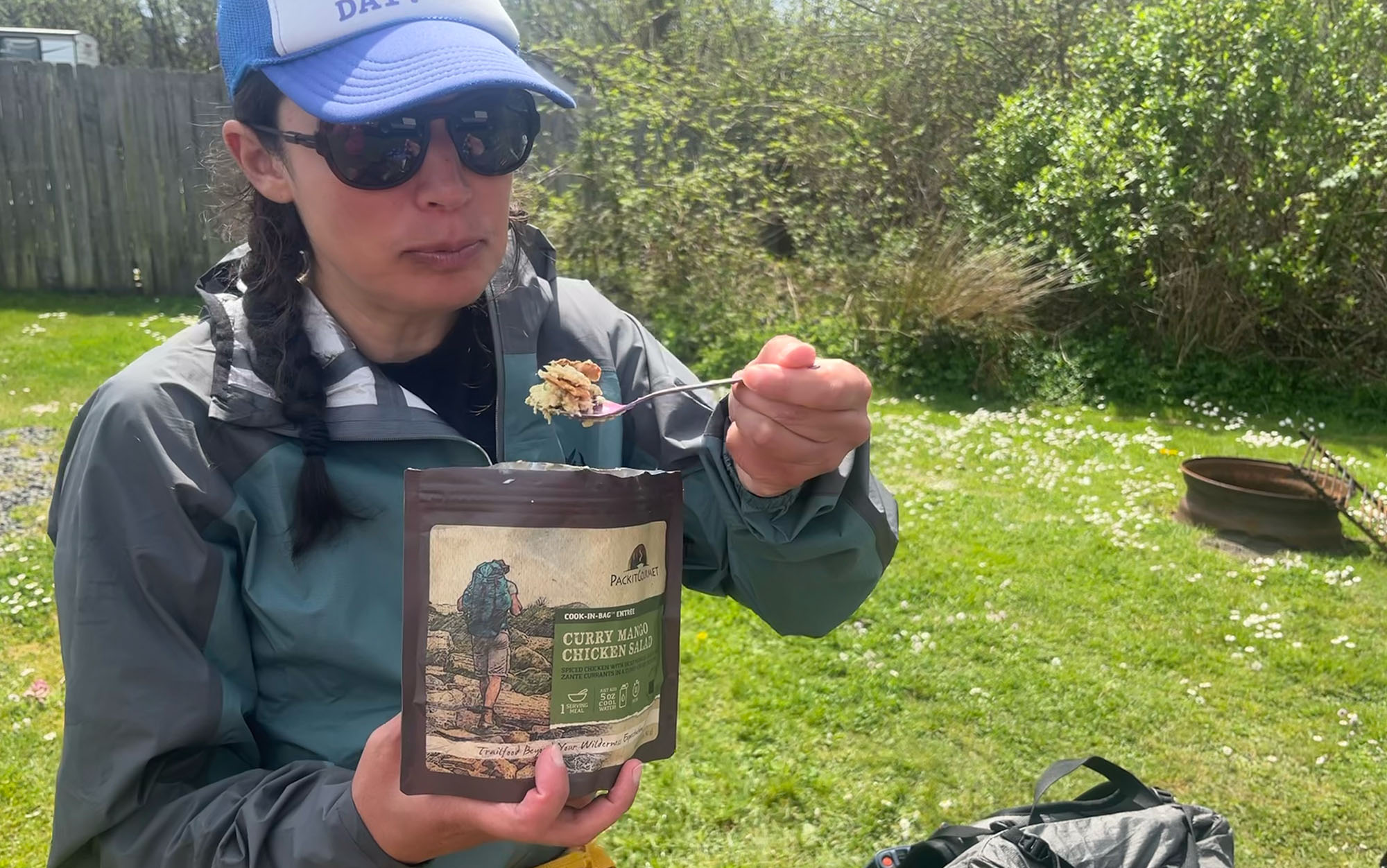
The only ding here is weight, which I measured at 1.2 ounces above the stated manufacturer weight. I don’t think these make the best option for backpackers (the MSR Titans, the Snow Peak, or the GSI Pouch Spoon fit better for that category), but for car campers and picnickers, these make an excellent, ideal budget option.
The Rest of the Field
I also tested the following camping utensils:
- Sea to Summit Delta
- Sea to Summit AlphaLight
- The tableware set from Coleman
- Industrial Revolution Utility Spork
- Gerber Devour Ti Multi-Fork
- GSI Outdoors Spork + Sticks
- HydroFlask tableware set
All of these products had their pros, but they either broke during durability testing, were over priced, or were not designed as smartly as a direct competitor (or all three). Any product that broke during durability testing was disqualified from making the cut.
FAQs
Camping utensils can cost as little as a couple of dollars for a simple spoon to as much as $30 for a titanium spoon and fork set. While the price differentials between a single set can be small, these add up if you purchase multiple sets at a time.
Titanium marries the best of both aluminum and stainless steel, as it’s both lightweight and durable. However, titanium is generally more expensive than either aluminum or stainless steel. While this might be a limiting factor when choosing a cooking pot, the price differential between stainless steel or aluminum utensils and titanium utensils is less significant (as is the weight savings).
While you’re camping, you can hand wash your dishes with soap in either your portable camp sink or at the campgrounds designated camp sink (usually located by the restrooms). For backpacking, you can, if you want, take some of your filtered water 200 feet from the nearest water source and use the tiniest amount of biodegradable soap to clean your utensils properly, perhaps even with a cut-off chunk of sponge. Or you can do what the rest of us do and just rub it off with your bandana and toss it back into your pack for the next day—I won’t tell.
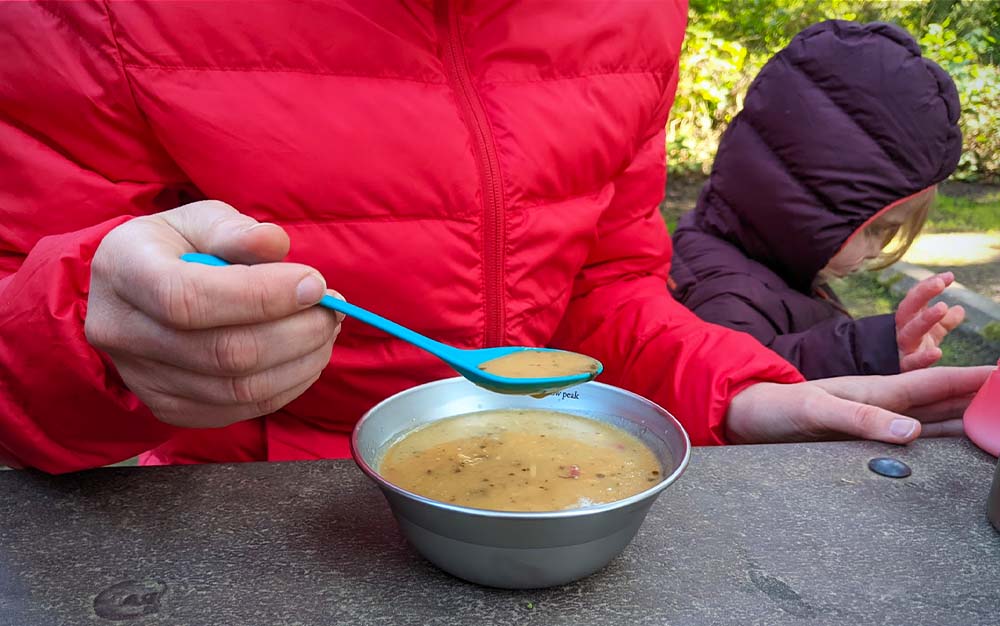
Things to Consider Before Buying Camping Utensils
Utility
Do you need lightweight camping utensils for backpacking or a durable set to take the kids car camping? Do you tend toward simple freeze-dried meals that require only a (longish) spoon, or are you eating full-sit dinners with a fork and knife? Determining how you’ll use your camping utensils or the things you need in camp will help narrow down the right set for your needs.
Materials
The best camping utensils are typically made from metal (aluminum, stainless steel, or titanium), or plastic. Each of them have their benefits and flaws. Metal utensils—both aluminum and stainless steel—are affordable options, but aluminum tends to be less durable, while stainless steel can be heavy. Titanium utensils are both lightweight and durable but typically more expensive than other options. Plastic utensils typically run cheaper than metals but will break sooner. Some also contain BPA, or bisphenol A, a chemical found in certain plastics and resins.
BPA Concerns
Materials with BPA are used for food and beverages, and have been found to seep into the food or liquid that they contain. This is a concern for many, as BPA is known to negatively affect the brain and prostate glands of children, infants, and even fetuses. There may also be a connection with increased blood pressure, type 2 diabetes, and heart disease. There has been a push to eliminate BPAs in products used for food and beverages. Two compounds that are sometimes used instead of BPA are BPS (bisphenol S) and BPF (bisphenol F). While studies are still being conducted on the long-term effects of these compounds, there is concern that they may present health risks equal to, or even greater than, that of BPA.
Weight
Unless you’re backpacking, weight might not be your biggest concern. Titanium, aluminum, and plastic tend to work best for lightweight backpacking materials. Stainless steel, though durable, feels quite heavy by comparison.
Durability
Since utensils are often stuffed haphazardly into backpacks or camping boxes and the rest of your camping dishes, they need durability. Stainless steel and titanium tend to be more durable materials for camping utensils than other choices.
Cost
If you’re purchasing a single set of utensils, most of these options won’t break the bank. However, if you plan to purchase sets for a family of four or more, you might want to consider the price before purchasing several.
Why Trust Outdoor Life?
Since 1898, OL has been a leading authority in testing and reviewing hunting gear, fishing tackle, guns and shooting equipment, and much more. We have more than a century-long history of evaluating products, and we’re now bringing that expertise to online reviews. Our editors are experienced outdoorsmen and women, and most importantly, we’re trained journalists. We prioritize field testing and objective data when reviewing products. We conduct interviews with gear manufacturers and engineers as well as outdoor experts so that our readers have an understanding of how and why a product works—or doesn’t.
Advertising does not influence our gear reviews and it never will. While we always focus our coverage on standout products—because we want our readers to be aware of the latest and greatest gear—we also cover the flaws and quirks of any given product.
Final Thoughts
A camping utensil has but one job: transport food into your mouth. So, if you’ve carried this utensil around all day in your pack, only to find out that it has broken on you when you’re at your very hungriest, well, you’re going to be one unhappy camper. That’s why I’ve put such a premium on durability in my review. Clever designs and lightweight materials are cool, but they do you no good when your spork is busted into three pieces. Choose the best camping utensils for your activities and prioritize durability above all else.
- Best Overall: Snow Peak Titanium Fork & Spoon Set
- Best Multi-Function: Outdoor Edge ChowPal
- Best for Backpacking: MSR Titan Fork and Spoon
- Best Minimalist: GSI Pouch Spoon
- Best Budget: Ust Klipp Utensil Set
